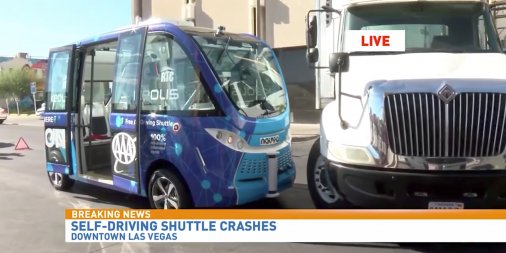In case you missed it, a fairly significant pilot of self-driving vehicles, in this case shuttle buses, launched last week in Las Vegas. In this test, shuttle buses developed by French company Navya ARMA will carry passengers along a half-mile route in downtown Las Vegas, (that part of Vegas that most of us who go to Vegas for Conference and conventions tend to ignore). The Navya ARMA buses rely on GPS, cameras, and light-detecting sensors in order to navigate the public streets. According to reports, the year long test hopes to shuttle about 250,000 passengers up and down the Vegas streets.
Pretty cool, right?
Guess what happened in the first couple of hours after launching the self-driving pilot program?
Yep, a CRASH.
The first self-driving bus was in a minor accident within a couple of hours of the service's launch when a (human driven) delivery truck failed to stop in time and collided with the stationary shuttle bus.
According to a spokeperson from the American Automobile Association, "The truck making the delivery backed into the shuttle which was stopped. Human error causes most traffic collisions, and this was no different."
No one was hurt, the damage was minor, and the self-driving pilot program continues in Las Vegas.
Why bring this up, especially on a blog that at least pretends to be about work, HR, HR Tech, etc.?
Because these kinds of technology developments, of self-driving vehicles, robots that can sort and organize inventory in warehouses, robots that will greet and provide basic customer services in retail environments and hotels, are being developed, improved, and deployed at increasing rates and in more and more contexts.
Self-driving technology in particular, especially for commercial vehicles, is by some estimates within 10 years of becoming a mainstream technology, potentially displacing hundreds of thousands of commercial truck drivers. And as an aside, this piece describes how the trucking industry is clearly not ready for this and other technological disruptions.
This is not meant to be another, tired, 'Robots are taking our jobs' post, but rather another reminder that technology-driven disruption will continue to change the nature of work, workplaces, and even our own ideas about the role of people in work and the economy. And HR and HR tech leaders have to take a leading role in how, where, when, and why their organizations navigate these changes, as they sit directly at the intersection of people, technology, and work.
And lastly, if that Las Vegas delivery truck had been equipped with the same kinds of self-driving tech that the Nayva ARMA bus has, there is almost no chance there would have been an accident.
But it might have be fun if it happened anyway. I'd love to see two 'robot' trucks argue with each other on the side of the road about which one was the doofus who caused the accident.
Have a great day!